Abstract
The purpose of this survey of 528 black men in Miami and Fort Lauderdale, FL, was to assess prostate cancer knowledge among African-American, English-speaking Caribbean, Haitian-American, and African men in America. Knowledge levels were assessed by education, ethnicity, age, income, family history of prostate cancer, and perceived prostate cancer knowledge. Twenty-five barbershops were visited during Fridays, Saturdays, and Sundays over a course of five months. The response rate was 99%. As the black men waited to be seen by their barbers, three interviewers asked them to answer the demographic and knowledge questions. SPSS was used to analyze the data. The main findings were that knowledge levels were adequate, with mean correct responses being 68.4%. Approximately 19.1% of respondents answered 80% of questions correctly, and 7.1% answered 100% of questions correctly. There were no statistically significant differences in knowledge among black men of different ethnicities. There were only two factors which were significantly related to prostate cancer knowledge. Men who earned more than dollars 50,000 and those with a family history of prostate cancer scored significantly higher than lower-income men and men with no family history of prostate cancer. As the percentage of Caribbean-American men and African men in the United States continues to increase, especially in metropolitan centers, those men at highest risk need to be targeted vigorously so that the disproportionate burden of prostate cancer on black men can be relieved.
Full text
PDF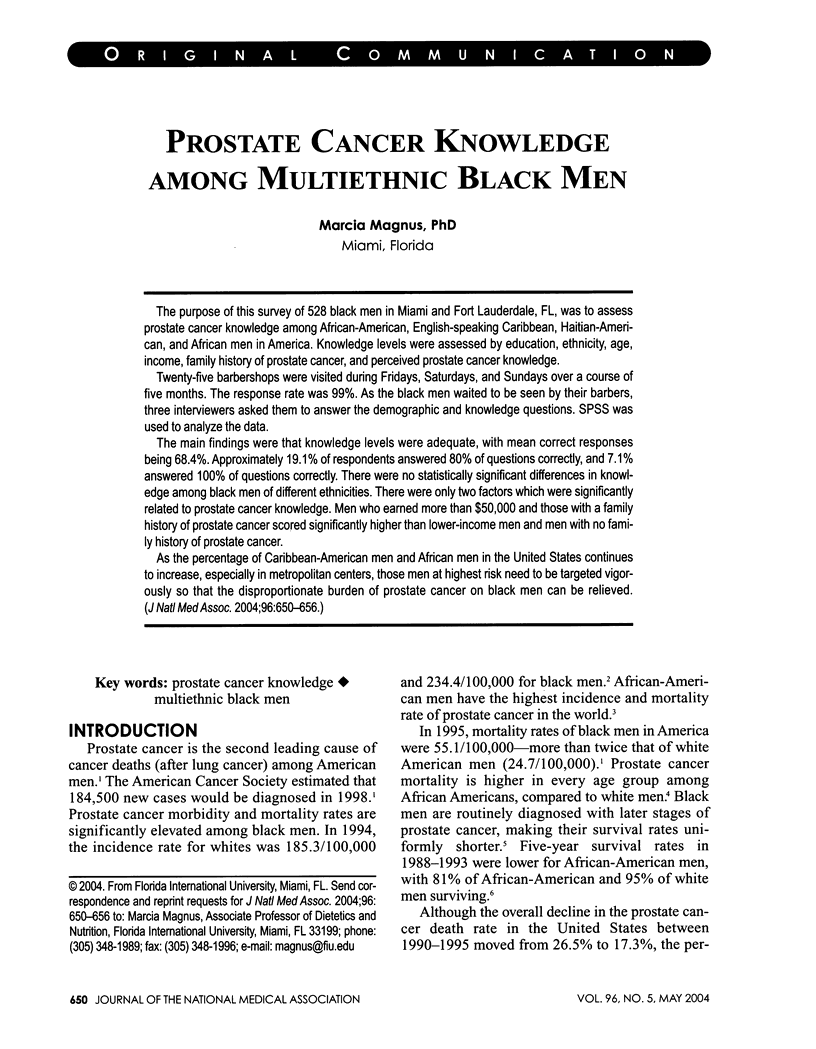
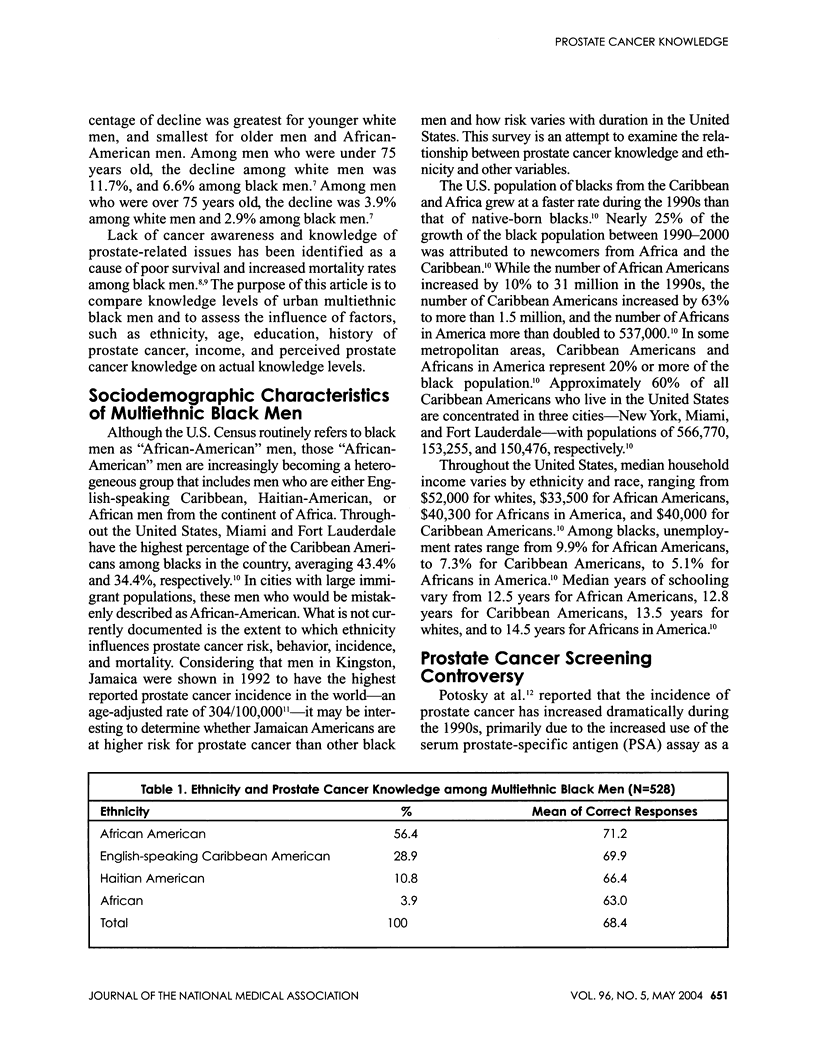
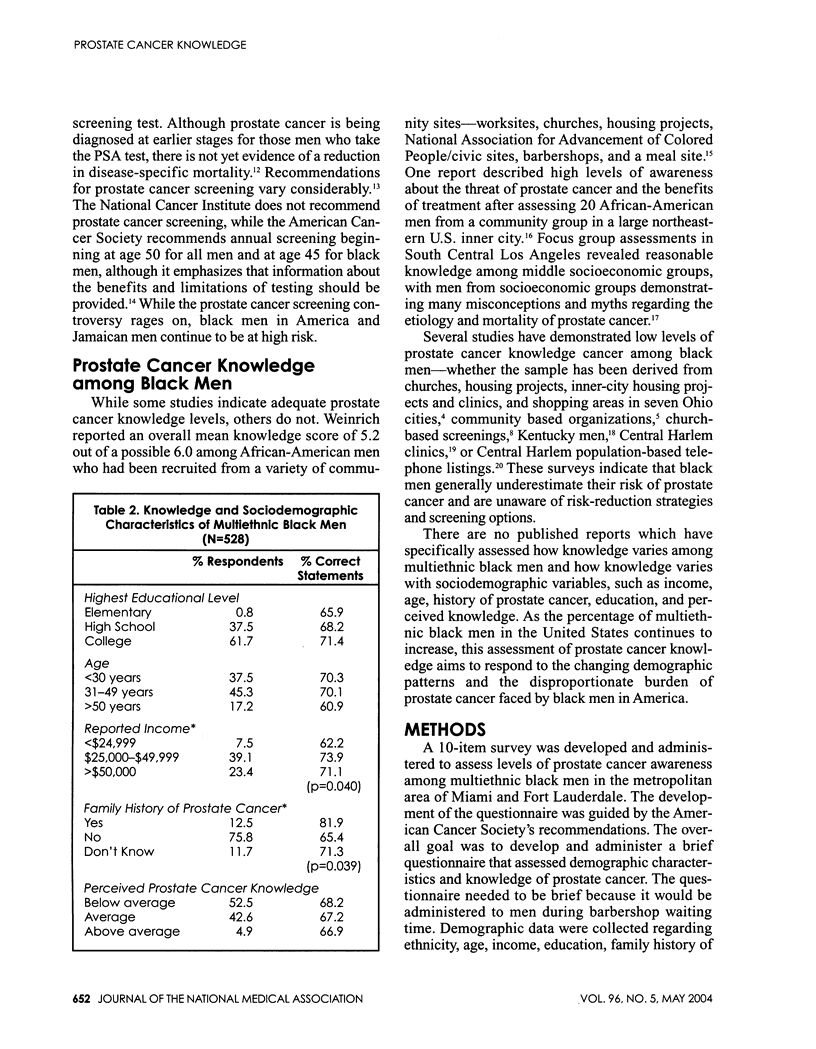
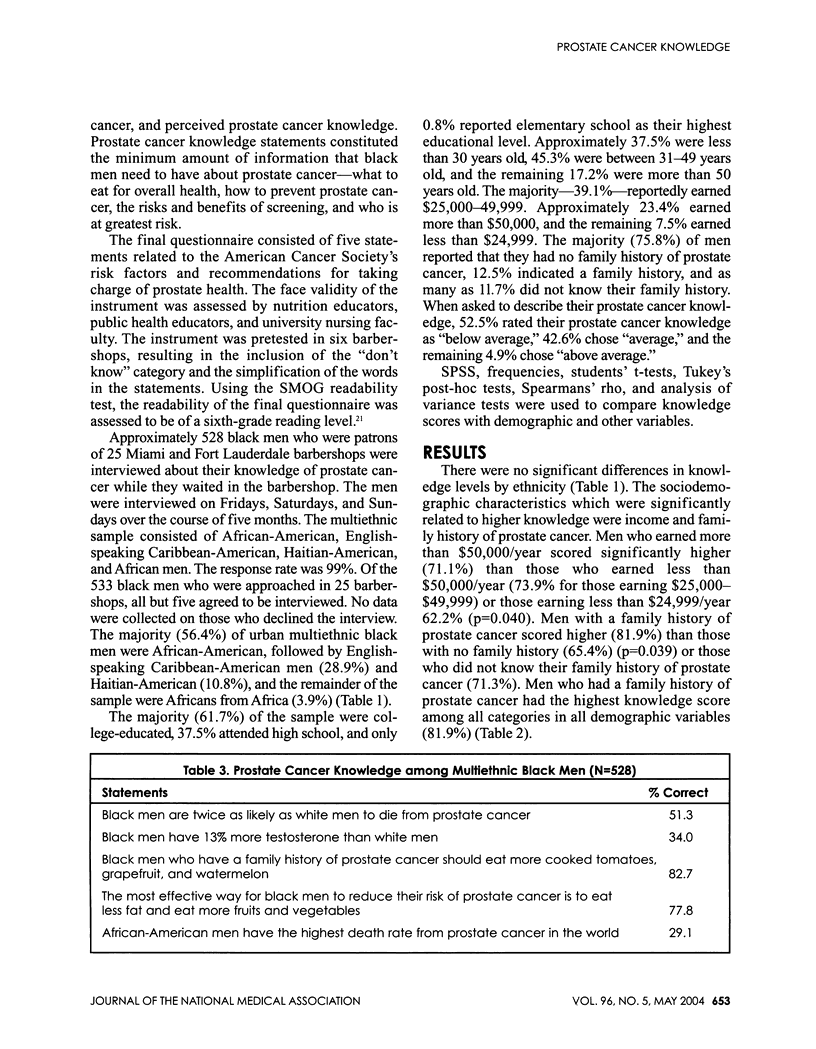
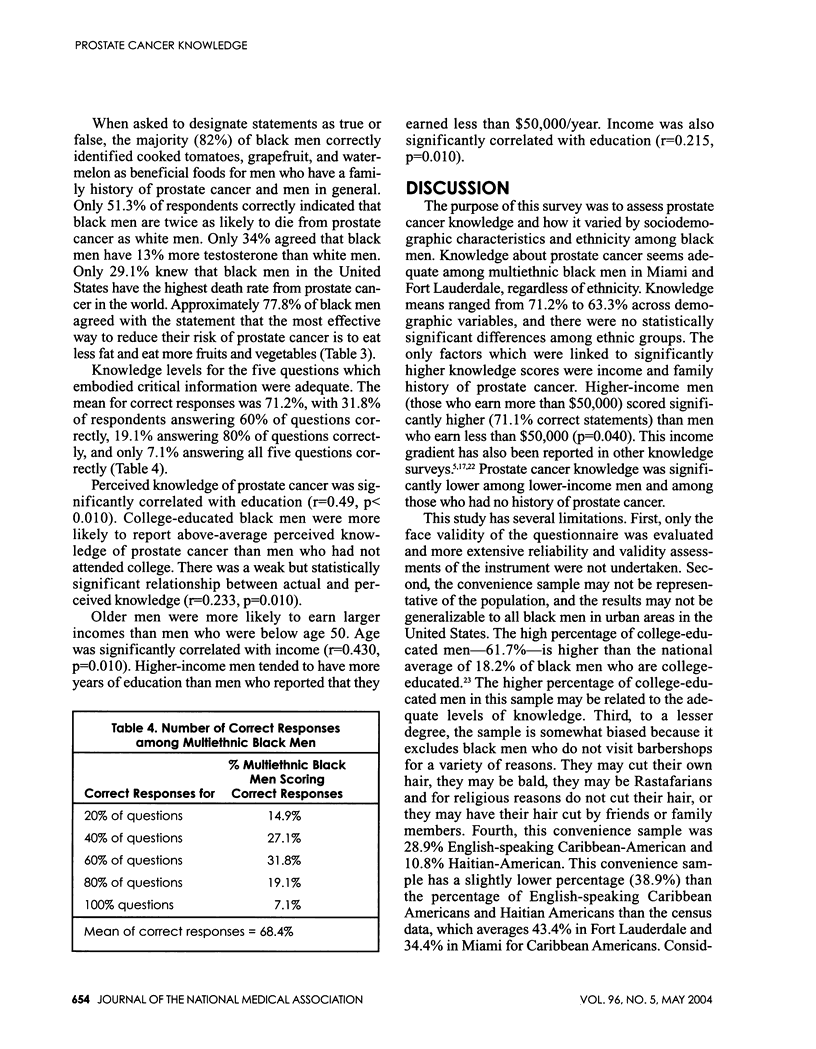
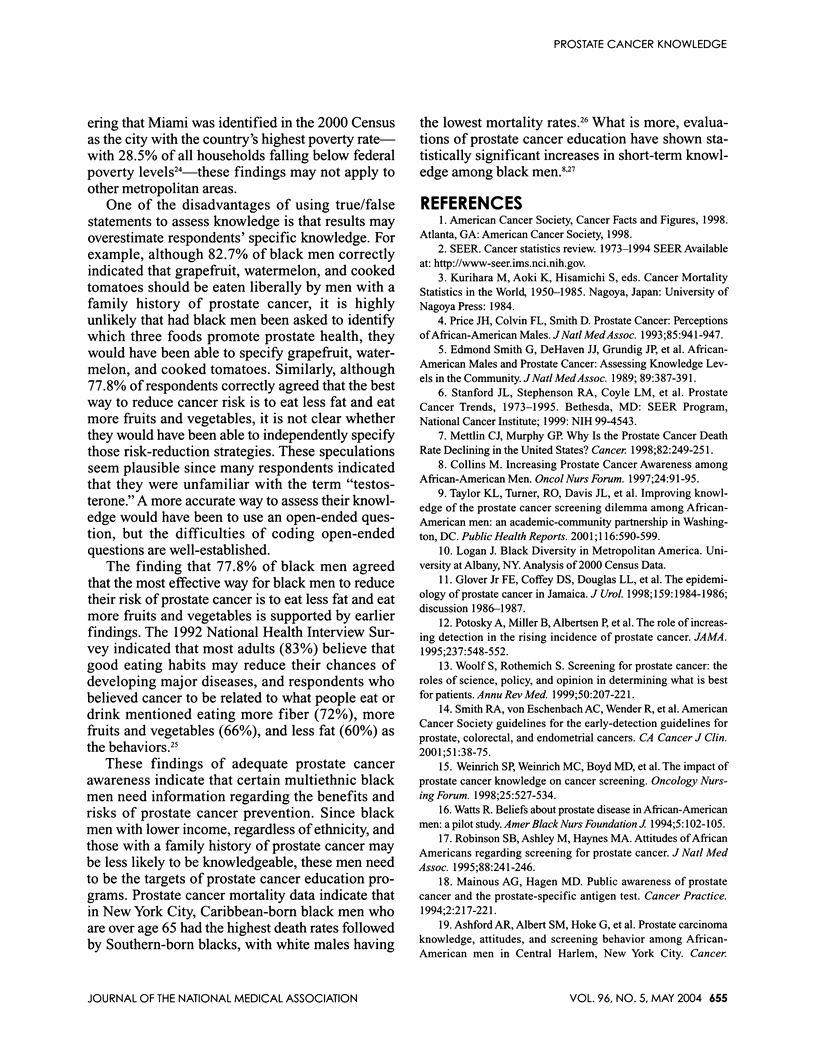
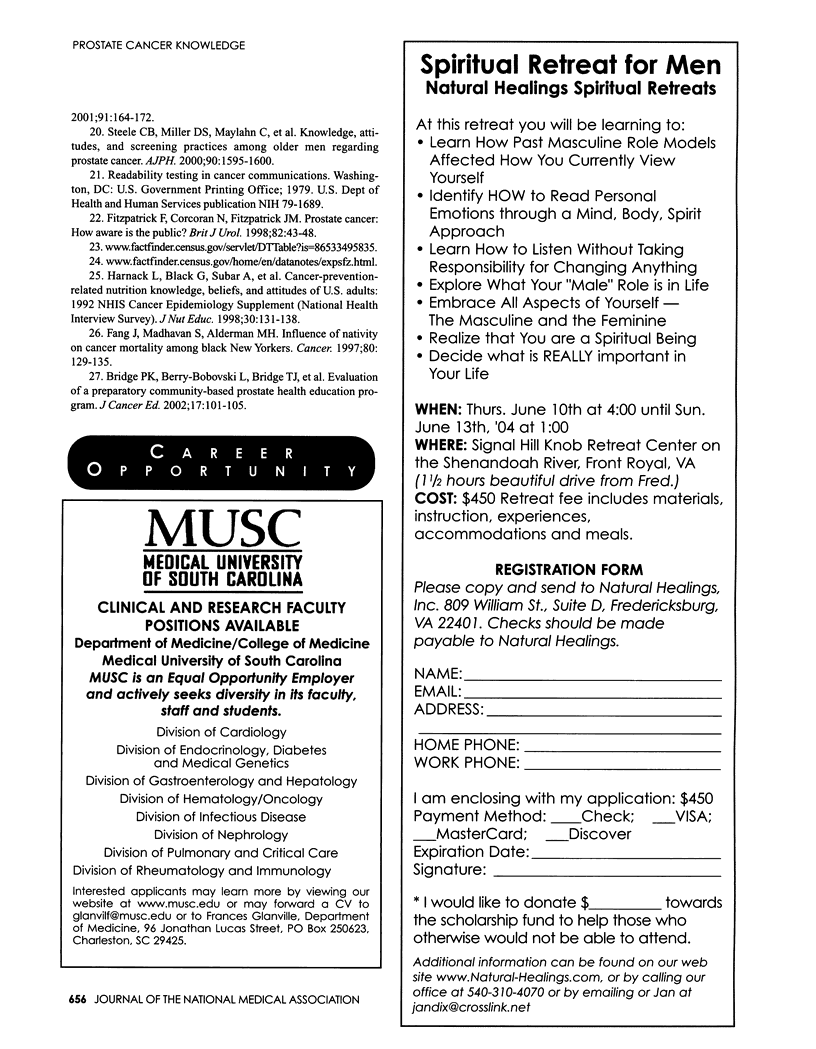
Selected References
These references are in PubMed. This may not be the complete list of references from this article.
- Bridge Patrick D., Berry-Bobovski Lisa, Bridge Tana J., Gallagher Richard E. Evaluation of a preparatory community-based prostate health education program. J Cancer Educ. 2002 Summer;17(2):101–105. doi: 10.1080/08858190209528808. [DOI] [PubMed] [Google Scholar]
- Collins M. Increasing prostate cancer awareness in African American men. Oncol Nurs Forum. 1997 Jan-Feb;24(1):91–95. [PubMed] [Google Scholar]
- Fang J., Madhavan S., Alderman M. H. Influence of nativity on cancer mortality among black New Yorkers. Cancer. 1997 Jul 1;80(1):129–135. doi: 10.1002/(sici)1097-0142(19970701)80:1<129::aid-cncr17>3.0.co;2-#. [DOI] [PubMed] [Google Scholar]
- Fitzpatrick P., Corcoran N., Fitzpatrick J. M. Prostate cancer: how aware is the public? Br J Urol. 1998 Jul;82(1):43–48. doi: 10.1046/j.1464-410x.1998.00685.x. [DOI] [PubMed] [Google Scholar]
- Glover F. E., Jr, Coffey D. S., Douglas L. L., Cadogan M., Russell H., Tulloch T., Baker T. D., Wan R. L., Walsh P. C. The epidemiology of prostate cancer in Jamaica. J Urol. 1998 Jun;159(6):1984–1987. doi: 10.1016/S0022-5347(01)63220-8. [DOI] [PubMed] [Google Scholar]
- Mainous A. G., 3rd, Hagen M. D. Public awareness of prostate cancer and the prostate-specific antigen test. Cancer Pract. 1994 May-Jun;2(3):217–221. [PubMed] [Google Scholar]
- Mettlin C. J., Murphy G. P. Why is the prostate cancer death rate declining in the United States? Cancer. 1998 Jan 15;82(2):249–251. doi: 10.1002/(sici)1097-0142(19980115)82:2<249::aid-cncr1>3.0.co;2-m. [DOI] [PubMed] [Google Scholar]
- Potosky A. L., Miller B. A., Albertsen P. C., Kramer B. S. The role of increasing detection in the rising incidence of prostate cancer. JAMA. 1995 Feb 15;273(7):548–552. [PubMed] [Google Scholar]
- Price J. H., Colvin T. L., Smith D. Prostate cancer: perceptions of African-American males. J Natl Med Assoc. 1993 Dec;85(12):941–947. [PMC free article] [PubMed] [Google Scholar]
- Robinson S. B., Ashley M., Haynes M. A. Attitudes of African Americans regarding screening for prostate cancer. J Natl Med Assoc. 1996 Apr;88(4):241–246. [PMC free article] [PubMed] [Google Scholar]
- Smith G. E., DeHaven M. J., Grundig J. P., Wilson G. R. African-American males and prostate cancer: assessing knowledge levels in the community. J Natl Med Assoc. 1997 Jun;89(6):387–391. [PMC free article] [PubMed] [Google Scholar]
- Smith R. A., von Eschenbach A. C., Wender R., Levin B., Byers T., Rothenberger D., Brooks D., Creasman W., Cohen C., Runowicz C. American Cancer Society guidelines for the early detection of cancer: update of early detection guidelines for prostate, colorectal, and endometrial cancers. Also: update 2001--testing for early lung cancer detection. CA Cancer J Clin. 2001 Jan-Feb;51(1):38–80. doi: 10.3322/canjclin.51.1.38. [DOI] [PubMed] [Google Scholar]
- Steele C. B., Miller D. S., Maylahn C., Uhler R. J., Baker C. T. Knowledge, attitudes, and screening practices among older men regarding prostate cancer. Am J Public Health. 2000 Oct;90(10):1595–1600. doi: 10.2105/ajph.90.10.1595. [DOI] [PMC free article] [PubMed] [Google Scholar]
- Taylor K. L., Turner R. O., Davis J. L., 3rd, Johnson L., Schwartz M. D., Kerner J., Leak C. Improving knowledge of the prostate cancer screening dilemma among African American men: an academic-community partnership in Washington, DC. Public Health Rep. 2001 Nov-Dec;116(6):590–598. doi: 10.1093/phr/116.6.590. [DOI] [PMC free article] [PubMed] [Google Scholar]
- Watts R. J. Beliefs about prostate disease in African American men: a pilot study. ABNF J. 1994 Jul-Aug;5(4):102–105. [PubMed] [Google Scholar]
- Weinrich S. P., Weinrich M. C., Boyd M. D., Atkinson C. The impact of prostate cancer knowledge on cancer screening. Oncol Nurs Forum. 1998 Apr;25(3):527–534. [PubMed] [Google Scholar]
- Woolf S. H., Rothemich S. F. Screening for prostate cancer: the roles of science, policy, and opinion in determining what is best for patients. Annu Rev Med. 1999;50:207–221. doi: 10.1146/annurev.med.50.1.207. [DOI] [PubMed] [Google Scholar]


